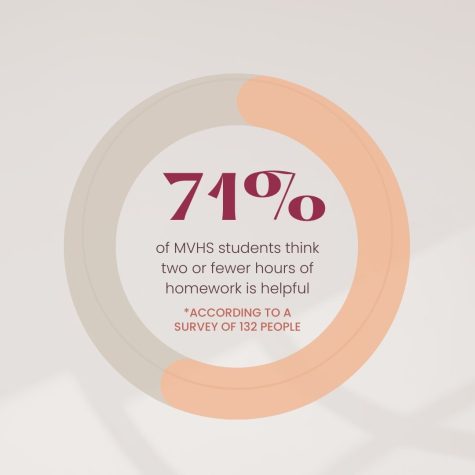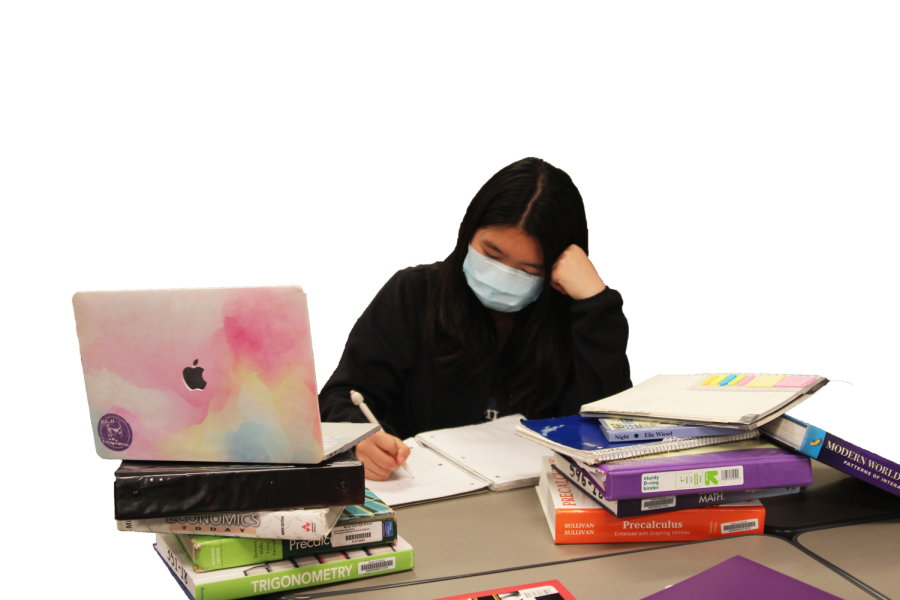Learning our limits
Understanding the value of balancing grades and homework with mental health
It’s crucial that students take steps to better understand their limits.
May 27, 2022
The amount of homework MVHS students should receive has been a popular source of discussion in our community among school administration, teachers, parents and students alike. On Tuesday, April 26, at a staff meeting, attendees explored the research and testimonies from a student, teacher and guidance counselor regarding this topic. One proposed solution to homework-related student stress was to assign a maximum of two hours of homework per night across all of a student’s classes. According to a Stanford study, more than two hours of homework a night may be counterproductive and diminish its effectiveness. This suggested homework policy was met with a variety of reactions, with some attendees agreeing with the policy while others feeling hesitant about its potential effects.
Only 24% of MVHS students have two hours of homework or less, meaning that 76% of students may be spending more time doing extra hours of homework that may not most effectively cultivate learning and development.
In addition to exploring this two-hour maximum as a collective commitment among staff, other measures to reduce student stress must also be implemented. MVHS staff should implement more learning opportunities to help students and parents understand the impact of their choices when planning their course schedules. It’s important for students and families to understand that it’s not possible to take multiple AP or honors courses without facing significant stress.
College students typically take four courses at one time, so if MVHS students are taking four AP or honors courses, that’s consistent with a college student’s workload. If they are taking seven courses, that can be nearly double the workload of a college student. Students also have to attend school each day, far more classroom contact hours than a college course, which may meet two to three times per week, which also greatly increases stress levels.

FUHSD should develop a policy for helping kids take on a reasonable course load. According to the Progressive Policy Institute, 86 percent of the top 153 universities and colleges in the United States restrict the awarding of AP credit. As a community, MVHS should reassure students that getting into their idea of a “good” college is still an option with fewer AP classes and that there’s no such thing as a college that’s universally “good” for everyone. MVHS should provide information about other factors besides rigorous classes or grades that can help with college admissions and avoid overloading students. For example, the school can provide more college informational seminars to educate families on the importance of other aspects of a student’s college application, including combining students’ interests with extracurricular activities so students can pursue their passions. By implementing programs to reduce the pressure of taking more classes one can handle, we will be able to foster a better learning environment for all.
Additionally, MVHS should work to better educate parents on an optimal balance of students’ mental health and rigorous courses to help students push their limits while keeping stress levels at a healthy point. According to a research paper on the effects of advanced placement science on students, more AP classes have been correlated to higher amounts of stress in students.
Pressuring students to take AP classes they aren’t committed to does not necessarily give them an edge when it comes to college admissions, especially if the student is not passionate about the subject of the class. Taking unnecessary classes may make the student feel more stressed and decrease the amount of time the student can spend on subjects they are genuinely interested in. If a student genuinely enjoys learning about a subject that may not align with their goals in higher education, the student can and should take the class as long as they are able to balance it with their mental health.
On a broader scale, the college admissions processes should be re-evaluated so students don’t worsen their mental health in trying to be more competitive for admissions. The UCs have recently omitted using standardized test scores as part of the admissions process, thus adding more weight to other aspects of a student’s application like outstanding performance in a certain subject, special projects and other awards in subjects students are actually interested in versus purely academic achievements. Colleges should work to make their admissions more holistic so that students can do well in subjects they are passionate about. Students would be less stressed if they focused their time and energy on doing well in activities they truly found joy in.
While MVHS can — and should — commit to reducing homework load to help students optimize their school-life balance, it’s ultimately up to students and families to choose classes that will help them grow but not break. Thus, it’s crucial that parents and students take an active role in seeking out these resources to better understand their students’ own limits.


















